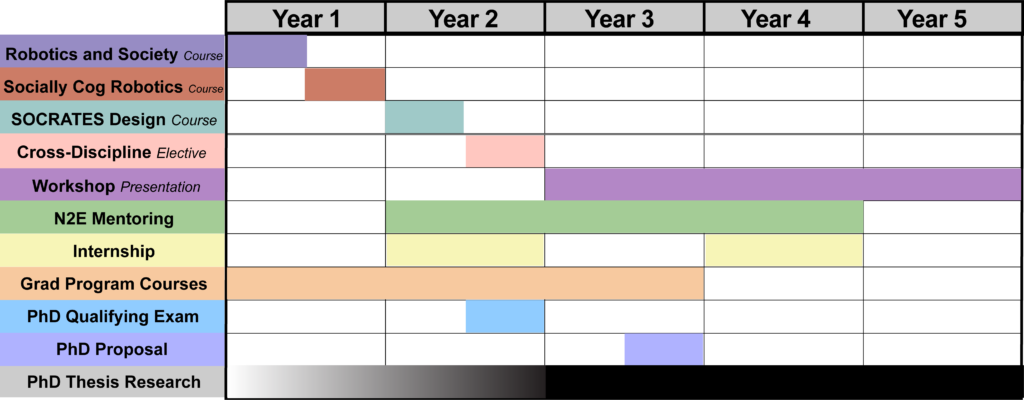NRT Traineeship
The NSF Research Traineeship (NRT) program is designed to encourage the development of bold, new, and transformative models for STEM graduate education training.
The educational goal of SOCRATES is to create an integrated cohort of technologists, behavioral and social scientists with a shared vision of socially cognizant robotics. This translates to a deep, multidisciplinary understanding of how robots interact with individuals and society as well as the technical skills to implement this vision. The coursework and research program will guide the students towards socially beneficial applications of robotics.

In the first year, all SOCRATES trainees will participate in a new interdisciplinary course entitled Robotics and Society jointly developed and taught by the co-PIs. This course introduces the trainees to the program and is also aimed at attracting non-trainees. Each student will have an assigned SOCRATES faculty mentor (not necessarily their primary research advisor) to guide them through the program. In addition, SOCRATES trainees and other participants will meet in monthly Chalk-Talk gatherings over brown-bag lunches for faculty talks, reading group discussions, as well as workshops for writing, presentations, and responsible research. This series will introduce new students to current research areas affiliated with the program, as well as connect senior NRT trainees with newer cohorts. The goal of these meetings, beyond the talks themselves, is to foster a sense of community and a common knowledge base among students from varied disciplinary backgrounds.
In Year 2, as shown in the Training Schedule, students will take two new required courses (developed as part of the proposed program): Socially Cognizant Robotics and Integrative Methods for Society-Based Robotics. This sequence is intended to provide students from all partnering departments with the necessary methods and technical skills in robotics, as well as engage them in a comprehensive study of the social effects on individuals and society. These new courses will be used for degree requirements of the participating departments (ECE, CS, PPP, PSYCH, MAE), and will have syllabi carefully constructed to help meet the goals of the SOCRATES program while ensuring that the anticipated time-for-degree does not increase. Existing courses from the participating departments will comprise electives for the trainees.
